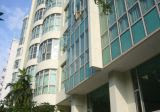Southeast Asia’s third-largest economy may expand 4.5 per cent to 5.5 per cent this year after shrinking 1.7 per cent in 2009, Bank Negara Malaysia said in its annual report today. The high end of the forecast matches the median estimate of seven economists surveyed by Bloomberg News. The government said in October that gross domestic product would expand 2 per cent to 3 per cent in 2010.
“Growth is expected to be driven by greater private-sector activity and robust external demand from the regional countries,” the central bank said. Bank Negara said it will maintain an “accommodative monetary policy stance” as the world’s economic rebound may be “gradual and uneven.”
Governor Zeti Akhtar Aziz raised interest rates for the first time in almost four years on March 4, joining nations from Australia to India in withdrawing stimulus. A strengthening economy may help Prime Minister Najib Razak cap the budget deficit this year, forecast by the government to narrow to 5.6 per cent of GDP from a revised 7 per cent in 2009, which was a 22-year high.
Recession Ends
Malaysia emerged from its first recession in a decade last quarter as exports such as Sime Darby Bhd. palm oil and Unisem (M) Bhd. semiconductors recovered. The economy should “improve further” in 2010 after growing 4.5 per cent last quarter, Zeti said in the report today.
Agriculture, mining, manufacturing and services are forecast to perform better this year, the central bank said. Unemployment may ease to 3.6 per cent of the labor force from 3.7 per cent in 2009, as companies boost hiring and salaries.
Mah Sing Group Bhd., a Malaysian property developer, said it’s “on track” to meet its 2010 sales target of 1 billion ringgit ($302 million), with revenue in the first three months tripling to 516 million ringgit from 170 million ringgit a year earlier.
Currency Climbs
“We believe that the expected economic expansion, improvement in the employment market, high savings and healthy affordability levels will contribute to higher demand for properties in the coming months,” Group Chief Executive Leong Hoy Kum said.
The ringgit has climbed 2.8 per cent this year, the third- best performer among 10 Asian currencies outside Japan, as Asia’s recovery drew funds to the region and Malaysia moved ahead of most of its neighbors in raising borrowing costs.
Malaysia may increase interest rates further to avert asset bubbles and discourage risky investments, even as inflation will likely remain “modest” this year, Zeti said in a March 12 Bloomberg Television interview. Bank Negara this month increased the benchmark rate to 2.25 per cent from a record-low 2 per cent.
Inflation is forecast to average 2 per cent to 2.5 per cent this year, accelerating from 0.6 per cent in 2009, the central bank said, citing improving economic conditions and “possible adjustments to administered prices and subsidy restructuring by the government.”
Inflation Contained
Najib’s government has said it plans to reduce spending by revamping subsidies on fuel and essential items from sugar to flour. Such goods are sold at below market rates in Malaysia because the state pays suppliers to keep prices low. Still, a plan to limit fuel subsidies to benefit the nation’s poorest consumers by May has been delayed to later this year, the consumer affairs ministry said this month.
While the price increases may push up inflation, “given that demand conditions are not expected to exert strong pressures on consumer prices, the impact is likely to be transitory and contained,” the central bank said.
Najib, who boosted government spending and eased investment rules last year to revive growth, is due to unveil policies next week to help Malaysia become a high-income economy. The leader, facing the strongest opposition presence in parliament since the nation’s independence in 1957, said yesterday he’ll keep rolling back policies that favor the country’s biggest ethnic group and sell stakes in state companies to lure investment.
Market Friendly
“Affirmative action will be more market friendly, more transparent and will be more merit-based,” Najib said in an interview in Hong Kong yesterday.
Najib last year increased the foreign ownership limit in Malaysian banks and stockbrokers and opened up services industries.
“The more competitive global environment creates urgency for Malaysia to transition to a high value-added, high-income economy,” the central bank said. Building a high-quality workforce and “competition-driven markets” are priority areas, as “protectionist policies undermine the fundamental incentive structure needed for a thriving entrepreneurial society,” according to the report.
Financial Blueprint
Malaysia is working on a new blueprint for the financial industry to meet the nation’s changing needs as it seeks to become a high-income and developed economy, the central bank said today.
The central bank will also pursue “progressive deregulation of rates and commissions” in the insurance industry to promote competition and innovation, Bank Negara Malaysia said in its Financial Stability and Payments Systems Report released in Kuala Lumpur.
Prime Minister Najib Razak, who boosted government spending and eased investment rules last year to revive growth, is due to unveil policies next week to help Malaysia become a high-income economy. He said he’ll keep rolling back policies that favor the country’s biggest ethnic group and sell stakes in state companies to lure investment.
Najib last year increased the foreign ownership limit in Malaysian banks and stockbrokers and opened up the services industries to overseas investors.
The country is reviewing existing legislation governing financial institutions to further clarify the central bank’s powers, Bank Negara said. The review will emphasize board oversight and governance while giving greater flexibility to well-managed companies, the bank said.
“An important consideration in the review is to promote a market-based environment for players to thrive and innovate while maintaining sufficient safeguards with adequate legislative powers for the bank to ensure that financial stability is preserved at all times,” Bank Negara said.
The government plans to enhance the country’s pension system, which will create opportunities for financial companies to provide retirement products, the central bank said.
LNG Exports
Malaysia, the world’s second- biggest exporter of liquefied natural gas, reduced shipments of the fuel last year as the global recession cut energy demand.
Exports fell 3 per cent to 22.2 million metric tons from a year earlier, Bank Negara Malaysia, the central bank, said in its 2009 annual report released today. The value of shipments dropped 23 per cent to 31.2 billion ringgit (US$9.4 billion).
Energy consumption slowed as the deepest recession since World War II cut the use of oil, coal and gas last year. The average price of Malaysia’s LNG exports tumbled 21 per cent to 1,406 ringgit a ton last year, the central bank said.
There was “lower external demand and the shutdown of several oil and gas facilities during the year for maintenance,” Bank Negara said.
Malaysia’s crude oil and condensates production dropped 4.1 per cent to 660,000 barrels a day last year, while natural gas output fell 3.7 per cent to 5.67 billion cubic feet a day. The declines led to a 3.8 per cent contraction in the country’s mining industry, according to the annual report.
Oil reserves rose to 5.52 billion barrels, equivalent to 22 years of current production. Gas reserves were at 14.66 billion barrels of oil equivalent, sufficient for 36 years based on current output.
Tapis crude oil, Malaysia’s benchmark grade, averaged US$65.42 a barrel last year, down from US$103.69 a year earlier, according to data compiled by Bloomberg News. Prices, which reached a record US$153 on July 15, 2008, closed at US$82.68 yesterday.
Malaysia is the largest LNG exporter in the world after Qatar. Condensate is a type of light oil produced in association with gas



No comments:
Post a Comment